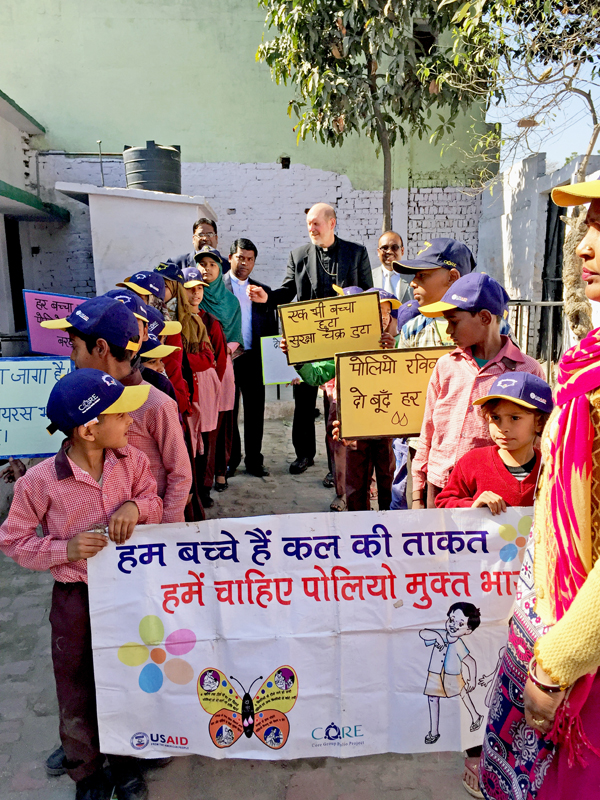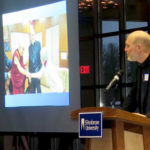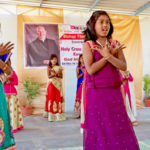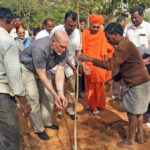By Barb Arland-Fye
The Catholic Messenger
Hindus, Muslims and Christians greet Bishop Thomas Zinkula outside the open-air entrance to their modest community center, the size of an American two-car garage, in the dusty rural village of Saharanpur. He has arrived for their mid-morning meeting to discuss the polio eradication program that involves a partnership among Catholic Relief Services, government frontline workers, the World Health Organization and other Non-governmental Organizations (NGOs).
 His visit here was one of many encounters on the peripheries that Bishop Zinkula made during a 10-day whirlwind tour of India seven weeks ago. Among the highlights: his presentation of the Pacem in Terris Peace and Freedom Award to the Dalai Lama.
His visit here was one of many encounters on the peripheries that Bishop Zinkula made during a 10-day whirlwind tour of India seven weeks ago. Among the highlights: his presentation of the Pacem in Terris Peace and Freedom Award to the Dalai Lama.
“Visiting a CRS program in India wasn’t on my radar screen until Kent Ferris, the diocesan director of social action, encouraged me to do so. He said a site visit by a U.S. bishop would lift the spirits of the CRS staff and provide an opportunity for me to advocate on behalf of international poverty-reducing humanitarian and development assistance when I returned home. I have been a huge supporter of CRS for years; seeing them in action made me an even more ardent fan. I was very impressed by their efforts in India.”
Polio has been eradicated in India, the second-most populous country in the world. Full immunization coverage in the state of Uttar Pradesh in north India is 53 percent, but in most of the districts where the CORE Group Polio Project (CGPP) is working, the coverage is lower than the state average, according to a CRS fact sheet.
The initiative to educate families of newborns to 5-year-olds about the importance of vaccinations is critical to preventing the disease from returning. The polio eradication program takes a grassroots approach, utilizing children and adults, to deliver the message to 320,000 households in the state of Uttar Pradesh.
Bishop Zinkula received a presentation by Abhishek Gupta, project officer with Catholic Relief Services, on the USAID-funded polio project during a meeting earlier in the morning. Also present were collaborators such as Father J.M. Demasis, the Diocese of Meerut’s director of social work. Kushal Neogy, sub-regional director — Partnerships (South Asia) for CRS, organized the visit.
Bringing community together
At the community center, the bishop listens in on the “community influencers” meeting. It precedes the “Pulse Polio Round,” which will be held the following week at a public place where community members are encouraged to go to get the oral polio drops administered to children ages 0-5.
Dr. Anand Kishore of the World Health Organization speaks to the village leaders in Hindi. He’s explaining the cases of polio in other countries and the seriousness of it, the bishop is told. Muslims, a minority religion in Uttar Pradesh, had earlier been hesitant to support the vaccination effort. They thought it might cause sterility in children receiving the polio vaccination, but were assured that it does not. So it is important that Muslim leaders are here for the meeting, the CRS representatives say.
The discussion point revolves around refreshing the village leaders about the importance of polio vaccinations and sharing the list of newborns (72) since the last round of vaccinations in August 2018. These leaders and influencers will reach out to the communities and motivate them to bring children (460 of them between the ages of 0-5) for the oral polio drop administration.
Some of the men at the meeting, dressed in white, sit up front in what looks like lawn chairs. The women, wearing colorful dresses and head scarves, sit on benches in the back of the room. Someone asks: Can polio be cured after it is diagnosed? Are medicines available to cure it? No, says Dr. Kishore, but the vaccine will help reduce the effects of the disease. He explains the importance of routine inoculations to protect children. “This is bringing the community together,” Fr. Demasis tells the bishop and other visitors.
Bishop Zinkula is asked to speak. “What you are doing here is very important and you are to be commended,” he tells the gathering. “You’re drawing people together in this community. That’s a wonderful thing. We need that everywhere.” The village leaders applaud.
“I admire your hard work,” said Father Francis Bashyam, a friend who is accompanying Bishop Zinkula on his travels in India. “All of us are interested in the well-being of our families and children. When the children are healthy, we keep the next generation healthy,” adds Fr. Bashyam, who serves in the Diocese of Bellary in southern India.
The bishop and his group accept an invitation from the head of the village to tea and cookies in his home. Soon, the whole group is in the living room, smiling warmly at their guests. The next stop is lunch before a visit to a school in an urban slum.
Along the road, the visitors see cages of chicken for sale in open-air markets. A vendor prepares tandoor tea in a flimsy kiosk. Kids dump garbage off of their carts into the streets. Auto rickshaws and motorcycles packed with riders and commodities careen through the streets.
Students get the message
Bishop Zinkula walks into a small classroom where primary school students sit on a rug and interact with their teacher in an activity called “Masti ki Kaksha (Fun Class). They are being encouraged to understand the disease of polio by participating in games, slogans and memorizing facts about the disease.
Each student stands up to identify themselves and their class level. After they finish, the bishop says, teasingly, “My name is Thomas, Class 100.” The teacher, a community mobilizing coordinator for the polio project, asks two girls to explain how polio happens, how it spreads, the location of the next polio round and how the polio vaccine is administered (two drops by mouth).
After answering questions, and impressing the bishop with their knowledge, the students huddle around a game board that looks like “Chutes and Ladders” and become totally absorbed in play. The game is structured to help them learn how to encourage families to get the little ones vaccinated.
Then the students prepare to take their rally into the streets of their neighborhoods. Each has been tasked with bringing 20 children to the polio round site. Their incentive: a lunch box. Bishop Zinkula inaugurates and flags the rally, as the children line up outside their classroom with their banners.
He distributes packages of cookies to each of the rally participants. They march out into the street, shouting “Two drops of life! Two drops of life!”
Polio project facts
The CORE Group Polio Project (CGPP) is a multi-country USAID-funded project in Kenya, Ethiopia and India. Catholic Relief Services (CRS) is a sub-grantee to World Vision Inc. supporting implementation in all three countries where CGPP operates. In India, CRS has supported polio eradication efforts since 2003, and most recently as a sub-grantee in its fourth five-year cycle (2017-2022).
“CRS is the outreach of the U.S. Bishops and the American church in more than 100 countries,” says Kent Ferris, director of Social Action for the Diocese of Davenport. “For our bishop to see that outreach firsthand attests to the integrity of the CRS collections (in parishes) and the ways that CRS asks us to be good stewards when we pray, when we learn, when we act and when we give.”











